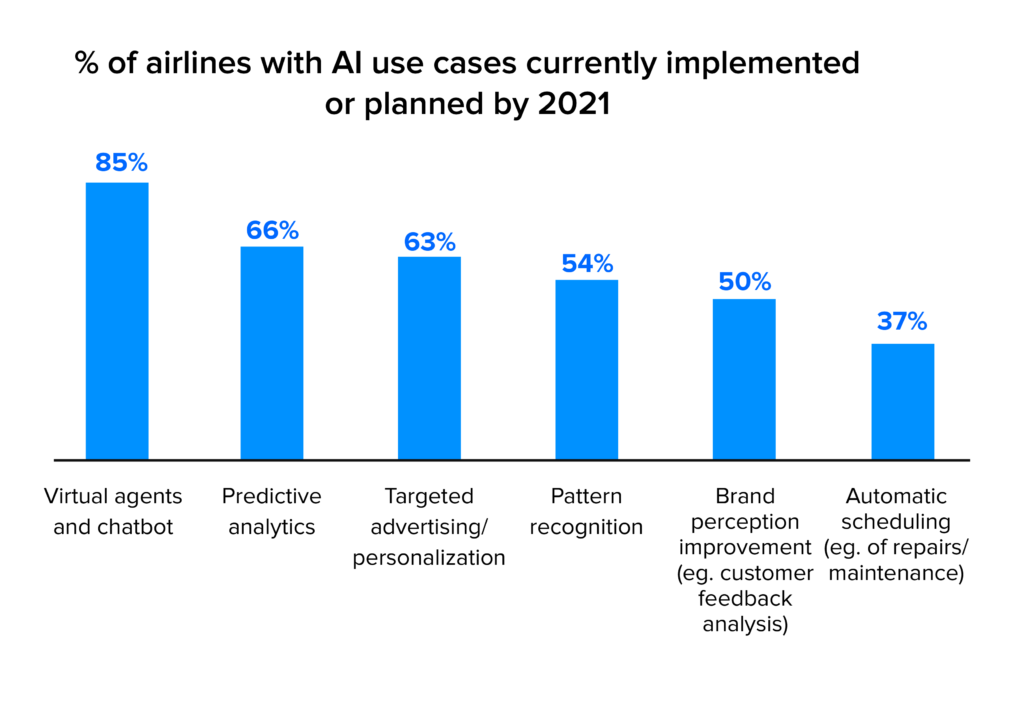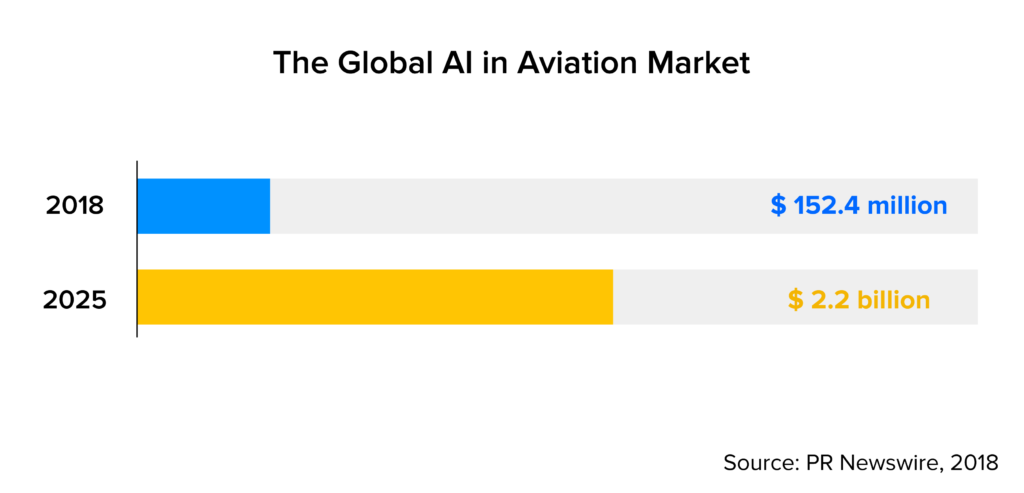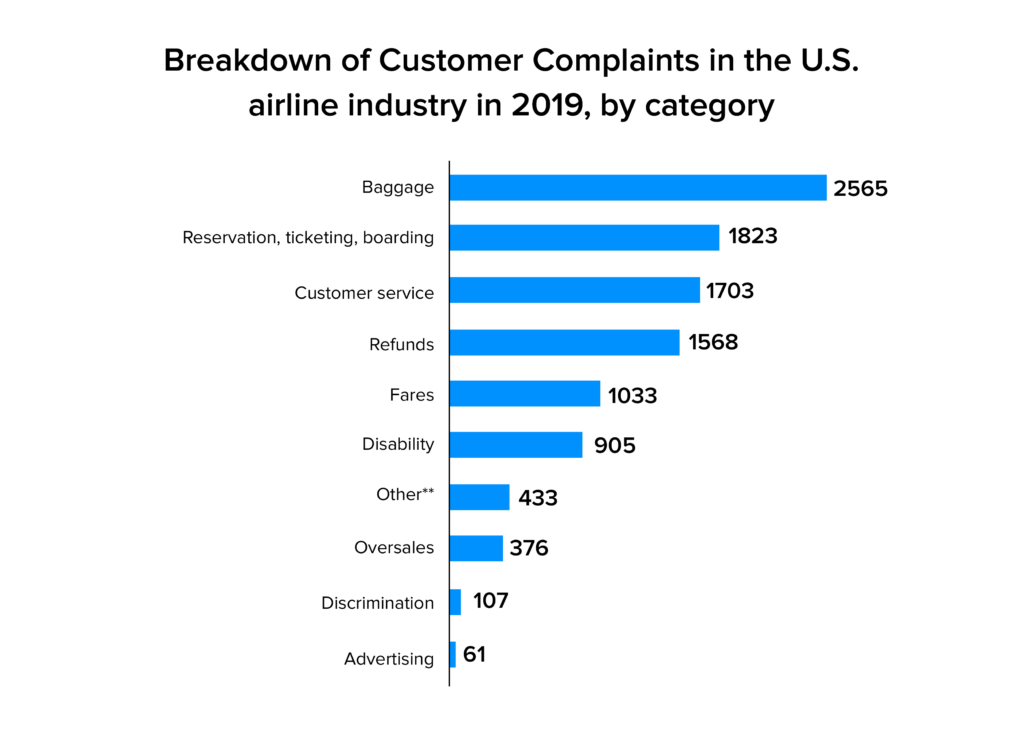AI-induced Resurgence for the Travel Industry Amidst COVID-19
The airline industry is probably the worst hit of all sectors due to COVID-19. As per figures released by the International Air Transport Association, a collective loss of US $84 billion will be inflicted on the industry in 2020. This is more than double the extent of loss (US$30 billion) that it suffered due to the global financial crisis in 2008.
Amidst an uncertain future, massive lay-offs, and carrier bankruptcies, experts place the turn-around time for recovery at 4-6 years, while some put it even further. In such an unpredictable air of gloom one thing is certain, the status quo has changed forever. The industry as a unit needs serious introspection combined with the power of technology to make travel contactless and safer than ever.
AI in the Aviation Industry – A Dire Need
Artificial Intelligence technology could be pivotal in transforming the face of travel. From the outset, AI rests on a solid footing of 4 key pillars namely:
- Machine Learning
- Deep Learning
- Natural Language Processing
- Computer Vision
In the pre-covid era, there were numerous use cases of airlines using Artificial Intelligence. While it was predominantly used to optimize digital operations, the technology has to step out of its mold and offer a scope of work for AI in airport operations to become a reality. If initial signages are to be believed, the role of AI in the travel industry will be broadened to acquiesce travelers to new standards of safety.

There is no plan B. Over 100 million jobs have succumbed to covid-induced lay-offs, and the travel industry is likely to bear losses worth $1 trillion. It’s time to explore the applications of AI in the aviation industry.
AI in Aviation to Quell Future-Shock
The need for AI-driven customer experience in the travel industry in the post COVID world is huge. At the same time, it should not be looked upon as the panacea, but rather a pain-killer, to mitigate losses and welcome passengers back. The following are some of the realistic scenarios that are just as conceivable, as they are implementable when it comes to the future of AI in the aviation industry.
A point to note is that irrespective of the use case or the state of COVID19 driven economic condition, AI has found a permanent place in the aviation industry.

Flying Optimized Routes
A lot of long-duration flights tend to have a mid-range landing spot, where often the passengers are required to undergo formal security procedures to check-in to a new flight. In formal terms, this is called a layover. The process is too discomforting from a traveler experience standpoint, forces human-human contact, and invariably increases the risk of community transmission.
Not to mention the fuel-refilling and the per capita resource consumption by passengers at the layover spot. One of the benefits of AI in the aviation industry in the post COVID world is that it can re-route and optimize long-duration flights. Till such time when the carriers reach full-capacity the shortest transit routes can be recommended by AI saving fuel and other capital-intensive resources.
Digitalized Check-ins
People are downright scared to get out of their homes let alone travel. For those mustering the fortitude to step foot on a plane, do so after ensuring the details about their boarding pass, baggage submission, weather updates, and flight status among other things. Presently, travelers have to toggle between multiple apps to gather each set of information. Leading travel app development companies in the industry are foraging ways through which AI helps in revamping the aviation industry.
Lufthansa, for instance, has provisioned for iterations to its mobile app so boarding passes could be stored digitally. An increasing number of pre-market trials suggest that smartphones could act as a one-stop-shop wallet storing necessary travel documentation. There could even be facial recognition to safeguard the app and ensure the best in class privacy. To roll the red carpet for an all-encompassing paperless travel experience, the International Air Transport Association (IATA) has initiated OneID, an identity management solution that will possibly incorporate AI-powered biometrics.
Baggage Assistance

** Other data includes complaints related to frequent flyers, smoking, tours credit, cargo problems, security, airport facilities, claims for bodily injury.
Baggage has always been a challenging area for the aviation sector. A challenge that is going to worsen in the COVID19 era. There is the consideration to be made for baggage deposits, wherein the luggage changes hands and multiplies possibilities of community transmission.
To tackle this, the airport concierge could innovate e-commerce apps operating to and fro between customer abodes and the airport. Empowering their architecture with RFID tags, and AI-enabled tracking systems, chances of not just baggage mishandling but also contact tracing can be mitigated in instances of virus transfer.
Not all of us would feel the safety net in trusting an unknown driver to take cost expensive items and dutifully deposit the same at airports. Therefore, for people hell-bent on doing things on their own, self-drop baggage lanes could save the day. In addition to reducing human dependency, they also cut short baggage processing times. Robots could be deployed in such lanes with AI-powered facial recognition software that would recognize the rightful owner of the items.
The airport operations staff must resolutely work towards increasing social distancing. One alternative for this emerged in the pre-pandemic era when JFK airport introduced Google Assistant’s interpreter mode. It supports 29 languages and will help international passengers with typical queries including airport navigation, luggage location, etc.
No doubt, AI is transforming the aviation industry in the post-COVID era. Another example of this would be in thermal imaging cameras. Made super efficient with passenger flow analytics and social distancing software, the cameras would scan body temperatures in real-time informing officials of doubtful cases that can be managed as per protocol.
AI-Fastened Security
One of the most cumbersome and inconvenient instances in the course to board a flight is security checks. All major airports mandate passengers to take off wearables and empty hand-bags so they can be thoroughly checked. Think we all can agree, the process is profoundly annoying. Not to mention the strict levels of distancing required to be maintained are not sustained when officials inspect travelers closely.
All this will be a thing of the past as Artificial Intelligence in aviation safety sees light at the end of the tunnel. State-of-the-art scanners would debut at the airports, infused with capabilities like X-Ray mapping, 3D image processing, and/or anomaly protection algorithms. Body scanners will be remodeled to incorporate AI technology.
AI-enabled automated target recognition algorithms synced into millimeter-wave scanners will make identifying rogue actors a click of the finger.
Digital Entertainment
Airport lounges see a significant number of people walk-in for entertainment/relaxation while waiting for the onboarding to commence. They are often empaneled with public computers and accessory booths used (and touched) by many. This needs to change. Carriers such as Delta Airlines are experimenting with a Parallel Reality experience that would facilitate multiple passengers, all simultaneously looking at the same screen, to view their respective flight information.
We have reason to believe that AI chatbot development is in full swing to complement the mass deployment of robots at airports. Chatbots in the airline industry will be fitted with facial recognition algorithms that would bring a wee bit of personal touch to machine-to-human interaction. Machines will be programmed to sing aloud the advantages of personal hygiene and sanitization. Lately, some of our partners have expressed interest in airline chatbot development. Such conversations are more than food for thought and if pursued with real purpose and a judicious budget, profitable advances can be made in a short period.
Robots for Product Delivery
Duty-free stores attract a lot of travelers thanks to unparalleled prices. But who said we need to risk public safety at such times for purposes of shopping. Store owners are realizing the significance of standardizing new norms to practice social distancing. For instance, Dubai Duty-Free while resuming operations posts the lockdown made customers use their concierge service to fill the cart.
Just so we leave nothing to the imagination, the carts were delivered to the customers by robots. The advantages of AI in the travel industry post Coronavirus are evident from such use cases.
In other locations, click-and-collect app models are establishing relatable grounds for business. Even before arriving at the airport, customers can order items waiting for them when they board-off the plane.
Final Thoughts
The inclusion of AI in the travel industry in the post COVID world is imminent. Agreeably, it will be a couple of years before the airports start bustling with the rush of people packed closed to each other and waiting for departures. A significant level of quid pro quo needs to be enacted for this distant, pun intended, reality to take a rebirth. Artificial Intelligence will take the mainstage in being the underpinning technology for all things automation.
Inclusion of AI in the travel industry will attract business-interest not limited to the airports, but branching well into the hospitality sector be it hotels, restaurants, or mobile food vans. With arguably the most talented technocrats under one roof, Appinventiv can be your technological partner.

strategies your digital product..



